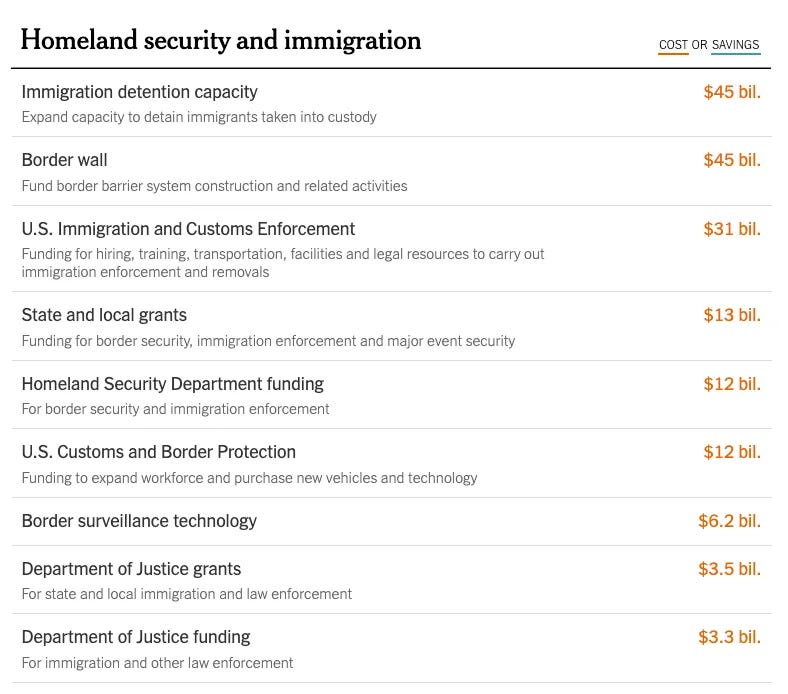The new budget bill of the United States will strengthen mass surveillance | Press review n°13
I selected important news on artificial intelligence during the week of June 30 to July 6, 2025. Here's my commentary.
Welcome to the thirteenth press review of Artificial reality. This week I focused on the “Big beautiful bill” and the links between technology companies and the army in the United States. Have a good read!
📰 Read
The new budget bill of the United States will strengthen mass surveillance
On Thursday, the House of Representatives passed the new budget bill, which allocates important funds for the acquisition and use of surveillance technologies.
Also known as “The big beautiful bill”, this budget reconciliation law contains the tax and spending policies that form the core of the agenda of President Donald Trump for his second term. According to the Congressional Budget Office, it will increase the public debt by $3300 billion over the next ten years, due in particular to the extension of tax cuts and a significant increase of the budget of federal agencies in charge of immigration and borders.
The law allocates, among others, $45 billion per year for immigration detention capacity, $31 billion for ICE (Immigration and Customs Enforcement), $12 billion for CBP (Customs and Border Protection) and $6.2 billion for border surveillance technology, Blood in the Machine reports.
“There is, in other words, a record-breaking store of federal funds dedicated to policing, detaining, and deporting people who live in this country,” says journalist Brian Merchant. “As has widely been pointed out, this bill makes ICE the single largest federal law enforcement agency in the country by a significant margin.”

Brian Merchant reminds us that ICE and CBP already have contracts with tech companies active in data analysis, surveillance towers and facial recognition. He asserts that these very important funds will allow law enforcement to acquire even more artificial intelligence systems to surveil the entire population in the name of fighting illegal immigration.
This process has already started. In an article published by Wired on Thursday, journalist Caroline Haskins reveals that the CBP wants to acquire new technological tools to analyze messages, photos, videos and contacts on the phones and laptops seized at the US border.
Since 2008, the CBP already uses the software Cellebrite to extract and analyze data on seized devices. It now intends to expand and modernize its digital forensics program to access encrypted messages as well, among others objectives. The CBP claims it analyzed more than 47,000 devices in 2024, a sharp increase since 2015 with 8,500 devices analyzed that year.
Also read: Surveillance drones fly over protests in the United States
A part of the $6.2 billion budget for border surveillance technology will be used to analyze biometric data obtained with facial recognition, iris scans and DNA collection, says Jai Dulani, of the NGO Tech Policy. This personal information will be stored inside the Departement of Homeland Security’s centralized biometric repository.
According to her, this budget bill, which shows an acceleration of the collusion between tech companies and the federal government, will increase the surveillance of everyone in the United States and threatens to fully convert the country into an authoritarian state.
Seven important news this week
ICE + CBP + Palantir: A Tool of Mass Political Repression (MindWar)
Trump’s Big Brother Bill Expands the U.S. Surveillance State (Derrick Broze)
Trump’s Big Bill Is Building a Big Police State (The Nation)
US Senate removes controversial ‘AI moratorium’ from budget bill (TechCrunch)
Don't forget what Silicon Valley tried to do (Blood in the Machine)
Uncle Sam Wants You To Wear a Smartwatch (Take Back Our Tech)
ChatGPT’s Mental Health Costs Are Adding Up (Bloomberg)
Read the other articles of the week I have selected by clicking here.
🎥 Watch
Executives from Silicon Valley have joined the Army
On Thursday, journalist Glenn Greenwald commented on a Wall Street Journal article published on June 13th, which explains that executives from Meta, OpenAI and Palantir have joined the US military.
Chief technology officers of Meta and Palantir Andrew Bosworth and Shyam Sankar, as well as the chief product officer and the chief research officer of OpenAI Kevin Weil and BobMcGrew have recently joined the Army innovation corps. These new reservists will serve for around 120 hours a year and will, for instance, teach soldiers how to use AI-powered systems.
Big Tech Execs Commissioned Into the Army
Seven important videos this week
What OpenAI Doesn’t Want You to Know (More Perfect Union)
Journalist Karen Hao on Sam Altman, OpenAI & the "Quasi-Religious" Push for Artificial Intelligence (Democracy Now)
Neuralink Reveals New Blindsight Implant (The Tesla Space)
This man says ChatGPT sparked a ‘spiritual awakening.’ His wife says it threatens their marriage (CNN)
The End of Learning As We Know It? (Taylor Lorenz)
ChatGPT Religion: The Disturbing AI Cult (Vanessa Wingårdh)
AI and the paradox of trust (Yuval Noah Harari)
Watch the other videos of the week I have selected by clicking here.
🔈 Listen
Silicon Valley warriors
In a new episode of the London Review of Books podcast, journalist Thomas Jones interviews Laleh Khalili, Professor of Gulf Studies at the University of Exeter, in England, and writer of Extractive Capitalism. They discuss the relationship between tech companies in Silicon Valley and the Pentagon.
Thank you for reading the thirteenth press review of Artificial reality! Subscribe for free to receive the reviews directly into your mailbox. With a paid subscription, you will also have access to all articles and to an exclusive monthly newsletter.
Have a good week,
Arnaud




